- Home
- Ben Counter
Malodrax Page 14
Malodrax Read online
Page 14
He reared up, heaving a great drift of bodies off him. He was roaring as he did so, the effort threatening to tear his enhanced muscles off the bone. He gulped down a breath before the human ocean closed over him again and, suddenly, that air was crushed out of him, and he could not breathe.
More were dying around him, their ribcages crushed or their skulls collapsed. He drove a hand upwards, out of the mass, shattering jaws and spines, but there was no room to draw it back in again. He was trapped. There was no way out. The light was cut off completely as the bodies heaped one on top of the other, as if to die in that crush was a religious observance, an honour these people were fighting for.
‘Enough!’ cried a voice from far above. The sound barely made it down through the groaning of the dying and the snapping of bones.
The pressure suddenly relented. Lysander gasped down a breath and almost choked on it, for it was laden with a heavy, spiced scent that made his head reel. The struggling around him lessened and he was able to force a space around himself. He lifted one foot and let bodies roll in under him, pushing off them to drive himself upwards and out of the heap.
The scent, like incense, was powerful enough to burn his throat. Lysander could feel his third lung struggling to filter out the toxins flooding the square. When he could see up into the square above, his vision was clouded by a clinging red-brown fug.
The cultists, those who lived, had distant eyes with their pupils wide black pools, their jaws hanging open and their bodies limp. They flopped into inaction where they had been clambering over one another to get to Lysander. They were draped over the balcony rails, and even as he watched some were slipping into unconsciousness and toppling down onto the mass of bodies that choked the square. A low, sighing moan was the only sound they made now as if falling as one into a deep sleep.
The buildings that bounded the square reached up into the distant skyline of the city. On one rooftop, clambering down by means of a set of spiderlike mechanical arms, was a humanoid shape. The arms were mounted on its back, into a rig that included two exhaust pipes from which was pouring the narcotic fog flooding the square.
As it descended Lysander made out its details. It wore armour of steel scales, clinging to its form – a woman’s form, Lysander realised. She carried a double-headed halberd, each blade wrought into the shape of a dragon’s head, and her helm similarly bore a lizardlike mask with a mass of silver teeth.
Lysander coughed and wiped a hand across his eyes to get rid of the residue. He pulled himself out of the mass of lolling bodies, and wrenched the book free. It was still the only weapon to hand.
‘I think,’ said the newcomer, ‘you have taken a wrong turn.’
‘What do you want?’ said Lysander. His hearts were still shuddering in his chest and his warrior’s instinct had not let go. He was still poised for danger.
‘Just curious,’ said the stranger. She descended on her mechanical legs, and landed deftly amid the bodies. Her mechanical limbs snickered up onto her back like those of a dead spider. She unlocked a catch on the side of her mask and it slid open, its panels folding into the scaled armour around her shoulders. Her face was long, pale and handsome with sharp eyes and nose, thin lips, and short black hair swept back from her face. It was altogether far too human for this city. ‘I am the herald of Lord Shalhadar the Veiled,’ she said. ‘He would greatly appreciate knowing more about the stranger in his city. It is fortuitous that you come to us in the festival season or you would have been stopped at the gates, but now you are in you have my lord’s attention.’ She spread her arms to indicate the unconscious, broken and dead cultists piled up in the square. ‘And some would say that you owe him.’
‘I seek audience with Shalhadar,’ said Lysander.
‘So do millions in this city,’ replied the herald. ‘But they have not demonstrated a capacity for violence such as you, and so perhaps you will get your wish.’
‘Are you daemon?’
‘Not yet,’ she replied with a half-smile. ‘I am Talaya, Veiled One’s herald. My lord dispatches me to watch over his city and his people, and to inform him of that which I decide he would wish to know. He knew you were here before you passed through the gate. I was sent to watch, and my lord’s interest was proven sound.’
‘And now you will take me to your lord,’ said Lysander, ‘to hand me over and be rewarded. Is that not so?’
‘It is not quite that simple,’ replied Talaya. She walked across the bodies towards Lysander, looking him up and down. ‘But I will take you to the palace, which is further than you would make it on your own. Everything after that is up to you.’
‘Then I see no use in dallying here.’
‘Of course.’ Talaya picked at Lysander’s cloak, which still clung to him, sodden with blood. ‘But you’re not going anywhere looking like that.’
9
‘I wonder when it was that I became a heretic. I had always been taught that it was like flipping a switch. One moment passes to another and suddenly one is corrupted and irredeemable, a single definite thought or deed shunting one onto the path of the unrighteous. But when it happened to me, it took the better part of a century. I cannot say when my soul’s purity left me, or what the cause was. I became a heretic without realising. Perhaps that it why it is so insidious, and why only one with such willpower as I can be permitted to even skirt the shore of that dark ocean.’
– Inquisitor Corvin Golrukhan
The Imperial Fists honoured their dead when they were safely beyond Shalhadar’s city, and when they were certain the city’s forces would not force them to battle. They found a depression in the broken ground, like a sunken amphitheatre, perhaps a shell crater from an ancient war or the sinkhole from a collapsed warren of tunnels beneath the ground. One Imperial Fist from each squad – Kaderic, Gorvetz and Lycaon’s own squad – stood as lookouts. The rest gathered in the centre of the depression, where were laid out the three who had died.
Brother Fornis was of Lycaon’s squad. His helmet had been removed and his face was calm, as if in the kind of sleep that was a rare luxury for a Space Marine. A single sharp-edged cut, like a slim dark triangle, in the breastplate of his armour was the only sign of injury – but the daemon’s blade had cut through one heart and his spine, and his system had broken down even as he fought on from the ground.
‘Let us commend Brother Fornis to the legacy of Rogal Dorn,’ said Lycaon over the body. As a Chaplain he had given these rites hundreds of times before, standing over the body of a fallen Imperial Fist. ‘There is no death so final that it can rob us of our place in the eternal war against the enemy. There is no fate so grave that it erases our duty. Brother Fornis was among the finest shots in the First Company, and his mind was as sharp as that of any soldier. He did his duty and honoured his primarch and his Emperor. Nothing more need be said of a member of the Adeptus Astartes. He has left this battlefield, but there will be another.’
Two more dead were from Squad Gorvetz. Brother Metzian was the Imperial Fist devoured by the sphinx at the palace gates. Only the upper half of his body had been recovered and lay there on the ground truncated at the waist in a mass of gem-like hardened blood. Metzian’s helmet stayed on, for it was split down the middle and his face beneath it was a ruin. Brother Kalanar, lying beside him, had died in the palace as Gorvetz was besieged on the upper levels by a host of daemons. Daemon claws had ripped into his back and gutted him. From the front, scatters of red wounds on his face and rents in his breastplate told a muted tale of what had happened to him. Beside Kalanar lay his plasma cannon, its casing still discoloured with the intense heat of its firing.
‘Kalanar and Metzian were as true-born brothers,’ said Sergeant Gorvetz. ‘Though we all are brothers, yet as we trained and fought I saw in them a shared purpose beyond our duty as soldiers. When the enemy pressed in on us, the brothers of my squad could turn to Metzian and Kalanar and know that in t
hem lay strength of purpose enough for all of us. Kalanar knew joy of battle when he brought the righteous fire. Metzian was a contemplator, a student of battle and its extremes. There were never two sons of Dorn less alike, and yet there were never two who so embodied our strength. They are gone from this battlefield, but there will be another.’
Techmarine Kho stepped forward and knelt by the bodies. One of the mechanical arms mounted onto his backpack cycled to a fine blade tip and reached down to open up an incision in Fornis’s throat. In the absence of an apothecary in the strike force, the task of harvesting the gene-seed of the fallen rested with Kho. Brother Gethor, who piloted one of Kho’s Land Speeders, stood behind Kho holding the sample jars which would hold the gene-seed for transport back to the Phalanx star fortress and the Chapter.
Lysander watched with the other Imperial Fists as the solemn business was concluded. He found Brother Halaestus’s eyes in the gathering, but he could read nothing in that mutilated face.
When the gene-seed was removed, the faces of the dead were covered and they were loaded onto the Land Speeders so they could be brought back to the Chapter and their bodies interred. The gene-seed was the priority – if the Land Speeders were lost then at least the gene-seed, on which the Chapter’s future rested, would survive.
‘Choose your best!’ demanded Chaplain Lycaon when the dead were stowed away.
The funeral games, in a major campaign or when there was more time to observe them, might see every manner of martial competition – marksmanship, athletics, a dozen forms of duelling, and more. Here, when they had to be concluded in less than an hour before the strike force moved on again, there was only time for one such competition. And yet it was ill luck not to observe it, for the dead Imperial Fists had themselves observed many times the funeral rites of their own fallen brothers.
From Squad Gorvetz, Brother Antinas stepped forward, handing his heavy flamer to the squadmate beside him. He stripped off the shoulder guards, breastplate, armguards and gauntlets of his armour, leaving him unarmoured from the waist up. Antinas’s cropped red hair contrasted with his pale skin, the surgical scars of his many augmentations still looking pink and raw. Of Lycaon’s veterans Brother Givenar stepped up. He was the largest Imperial Fist there, and the knotted muscles of his arms and chest were covered in incised kill-markings in the style of some of the Chapter’s oldest veterans. Each campaign he had fought was picked out there in scar tissue.
Sergeant Kaderic represented his squad. He had kneeled before the Chaplains of the Imperial Fists and sworn never to back down from an honourable combat, echoing the oaths taken by the first champions of Rogal Dorn and those still taken by the rare individuals chosen to champion the Emperor on the battlefield. Such an oath was a bold statement even for a Space Marine, and the Chaplains told parables of those whose oaths had been learned and twisted by the heretical and corrupt, compelling brave champions of the Imperial Fists to fight impossible odds. To take the oath meant that the principles of courage and honour were more important than petty concerns like survival.
The final competitor was Brother Gethor, his gene-seed duties done, representing Techmarine Kho, Halaestus, and Lysander – those members of the strike force who were not members of one of its three squads. Gethor was barely eighteen months out of novicehood, training under Kho to be elevated one day to the Chapter armoury and the training with the Priesthood of Mars to become a full Space Marine. He showed no trepidation even as he stood alongside three competitors far more experienced than him.
Lysander found himself standing beside Chaplain Lycaon as the first competitors lined up, the spectating Imperial Fists forming an ad-hoc fighting ring.
‘You fear for Halaestus,’ said Lycaon, quietly enough that only Lysander would hear.
‘Fear is a word I will never use,’ said Lysander, ‘of myself or of another brother.’
‘But,’ said Lycaon, letting the word hang.
Kaderic and Givenar were drawn to face one another. Kaderic scraped a handful of dirt from the ground and rubbed his hands dry with it. Givenar kneeled and murmured a prayer, fists held in front of him as if he were addressing them, imploring them to serve him as his wargear did in battle.
‘I cannot fathom what Halaestus has lost,’ said Lysander. ‘It is beyond my capacity to understand. It is rare that a Space Marine suffers so.’
‘Is he the same one you led as a squadmate?’ asked Lycaon.
Lysander paused before he answered. ‘No,’ he said.
‘You must watch him.’
Lysander looked at the Chaplain and realised in that moment that he did not know the man, not as he had known Halaestus and the other members of his squad. Perhaps that was what Chaplainhood meant – to stand apart from the battle-brothers of his Chapter, to make decisions that one too close to the men of the Chapter could not. ‘Of course,’ said Lysander. ‘I will stay close to him. I have known him a long time, and he will trust me.’
Lysander watched the bout begin, Kaderic charging into Givenar, lunging a shoulder into Givenar’s midriff and bundling him to the ground.
‘These are not your men, Lysander,’ said Lycaon.
Lysander did not reply. Though he had known it was true, he had not heard it said out loud.
‘Captain Venharts was not greatly loved,’ continued Lycaon, ‘for he was crude and forthright of word. But the First respected him, and they knew him for he served as their captain for more than thirty years. When he was lost they mourned him keenly. You are not Venharts, for good or for ill, and they do not look to you as they did to him. Does that dismay you, Lysander?’
Lysander had been tested by the Chaplains of the Imperial Fists a thousand years before, as the Chapter reckoned it, through novicehood and at every stage of his rise to a captain’s rank. He knew when he was being tested again, and Lycaon knew he knew. ‘Dismay? No, that is too strong a word. I understand what they feel. They are not my men, but I am not yet their captain, either. The First Company I knew was lost with the Shield of Valour. That will change, for the bonds that hold us together are forged in battle. If there is anything Malodrax will give us, it is battle.’
Givenar was better on the ground than Kaderic was on his feet. The two rolled over, Givenar with a forearm across Kaderic’s throat, trying to choke and submit. But Kaderic was stronger and he forced a knee underneath Givenar’s body. He levered Givenar off him, throwing him to the ground, leaping to his feet and wrapping an arm around Givenar’s neck from behind.
The brothers of Kaderic’s squad cheered. Kaderic bared his teeth at them in a savage smile. Givenar tapped his hand against Kaderic’s shoulder – the choke was in, the blood cut off to the brain, and Givenar had to either submit or let himself fall unconscious. Kaderic let Givenar go and stood, beat his chest, and accepted the offered hands of his squadmates.
‘What happened to the Vorel?’ asked Lysander.
‘You do not know?’ asked Lycaon. ‘It is recorded in the Chapter archives, I am certain.’
‘There was shame enough in speaking to the Chapter of how the First was lost,’ said Lysander. ‘If the Vorel prospered without our intervention, if Imperial subjects suffered at their hands, it would not be conducive to rebuilding my place in the Chapter.’
‘The Vorel predated on the frontier worlds for a century and a half,’ said Lycaon. ‘The declaration of Xenos Horrificus was well deserved. A Crusade was called against them and the Guard and Navy shattered their empire. Some still surface as mercenaries, but they are dying out.’
‘I see,’ said Lysander.
‘The blood of the Vorel’s crimes stains the hands of the Iron Warriors.’
‘I need no more reasons to kill Thul,’ said Lysander. ‘But for that, too, he will pay.’
The second bout’s competitors were lining up. Gethor and Antinas looked as unalike as two Space Marines from the same Chapter could. Gethor had yet to lose
the handsomeness that some novices brought with them, and which was inevitably worn away under scars and years. Antinas was as ugly as sin, scorched and scarred all over, his kill-markings covering his back, chest and upper arms in dark-brown High Gothic lettering. His hands were huge and gnarled and he clenched and unclenched them as the two circled, ready to strike.
‘We will march on Kulgarde next,’ said Lycaon. ‘The ground is rough and broken. Kho tells me that to the north is more cover, where we can travel unobserved should news of our arrival have reached the Iron Warriors. Do you concur with this course?’
‘It will slow us down,’ said Lysander, glad the conversation had turned to matters of battle. ‘But we must assume word has reached Kulgarde that Shalhadar is dead and the Imperial Fists killed him. Have you considered my suggestions for breaching the fortress?’
‘I have,’ said Lycaon, ‘and I will decide on them closer to the time. They are unorthodox.’
‘Any plan has to be if it is to succeed,’ said Lysander. ‘We cannot besiege Kulgarde with the force we have. A million Imperial Guard might not reduce its defences. Perhaps with a Titan Legion we could march on the walls directly, but we lack such a luxury.’
‘So I understand,’ said Lycaon. ‘But I would see for myself what we are facing before deciding how Kulgarde will fall.’
Antinas was stronger by far. He grabbed the younger competitor by the thigh and flipped him onto his back, throwing his head back and yelling at the sky. His squadmates echoed him. Gethor scrabbled to his feet and ducked back, crouching. Antinas beat his chest and advanced.
‘We must kill Kraegon Thul,’ said Lysander.
‘I will not return to the Phalanx if he lives,’ replied Lycaon. ‘And a lifetime of shame will accompany any of us who does.’
Antinas darted forwards, too quickly for a man of his size. He knocked Gethor’s guard aside and headbutted Gethor, catching him on the eye socket. Gethor reeled, dropped onto his back, rolled away and staggered upright again just out of Antinas’s range. Antinas pressed on, swinging at Gethor with blows hard enough to knock the younger man out. Gethor kept moving, swaying from side to side, desperation on his face as each swing came closer to leaving him in the dirt.

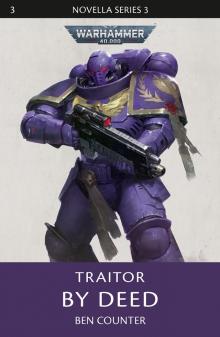 Traitor by Deed
Traitor by Deed Sacrifice
Sacrifice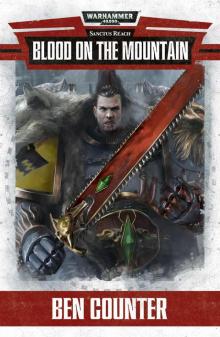 Blood on the Mountain
Blood on the Mountain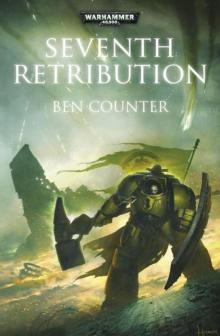 Seventh Retribution
Seventh Retribution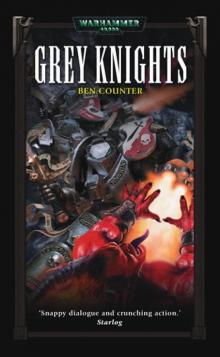 Grey Knights (Warhammer 40000)
Grey Knights (Warhammer 40000)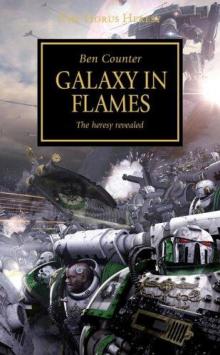 Galaxy in Flames
Galaxy in Flames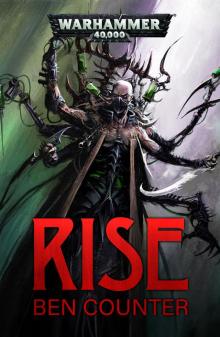 Rise – Ben Counter
Rise – Ben Counter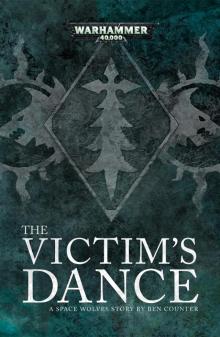 The Victim's Dance
The Victim's Dance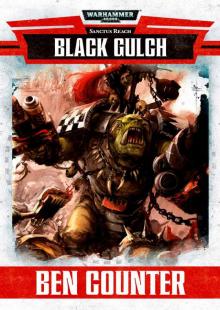 Black Gulch
Black Gulch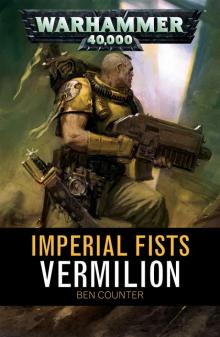 Vermilion
Vermilion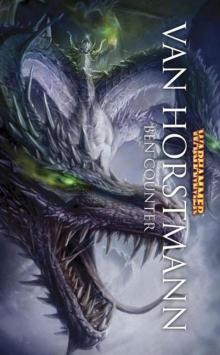 Van Horstmann
Van Horstmann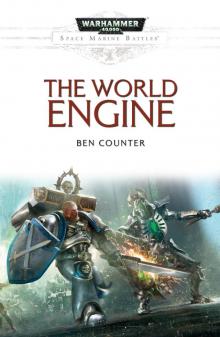 The World Engine
The World Engine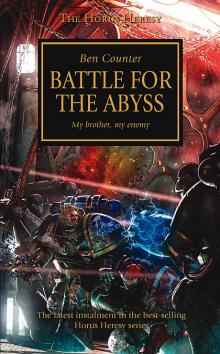 Battle for the Abyss
Battle for the Abyss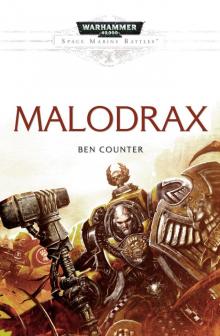 Malodrax
Malodrax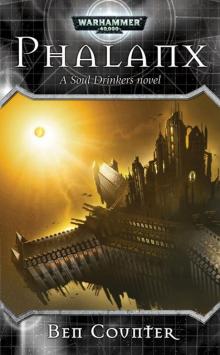 Soul Drinkers 06 - Phalanx
Soul Drinkers 06 - Phalanx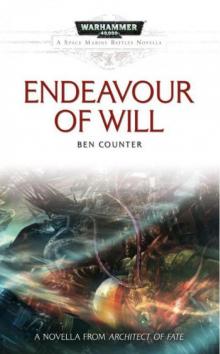 Endeavour of Will
Endeavour of Will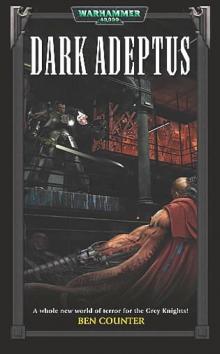 Dark Adeptus
Dark Adeptus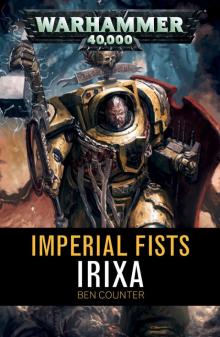 Irixa
Irixa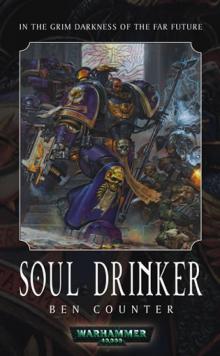 Soul Drinker
Soul Drinker